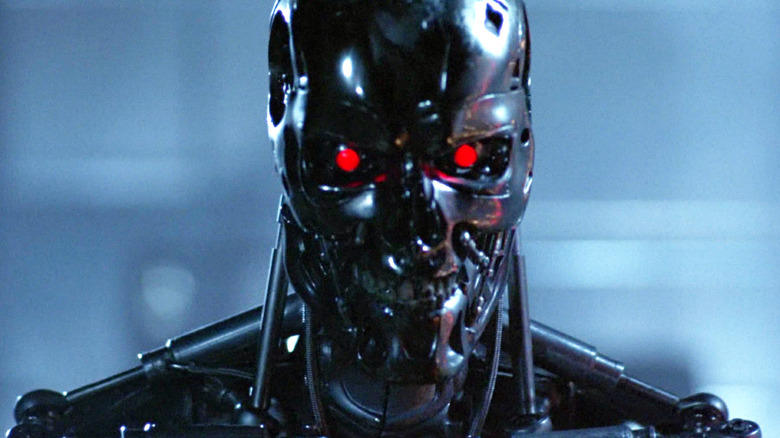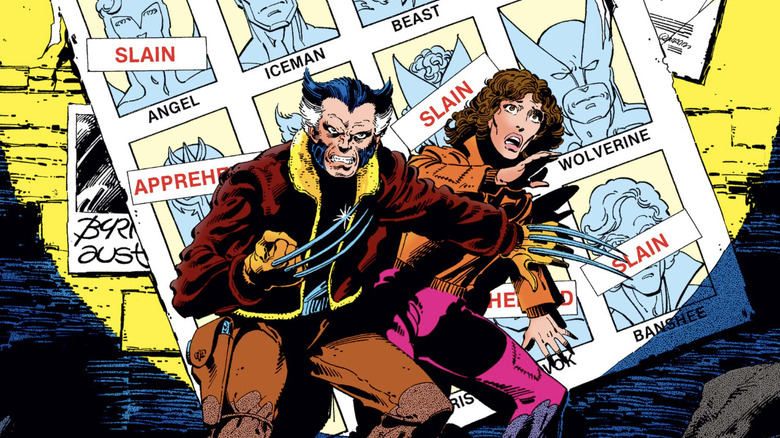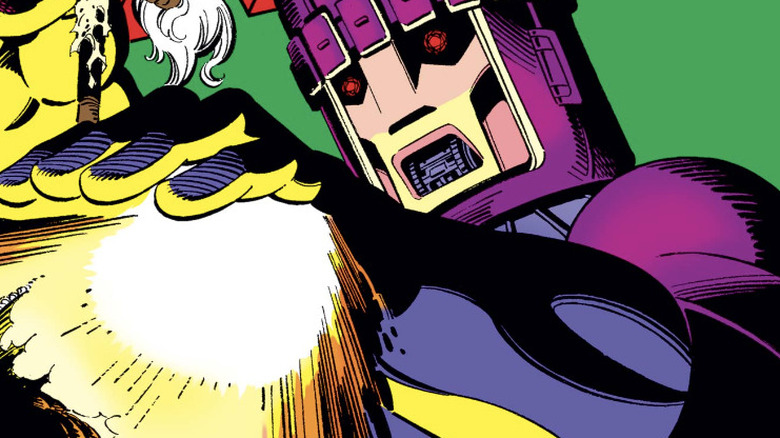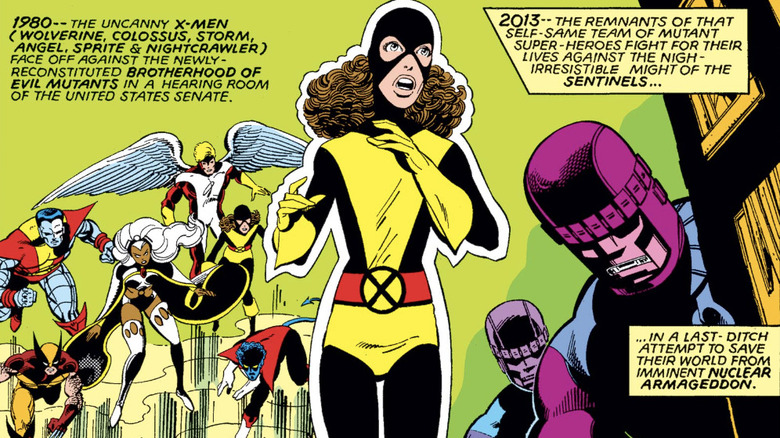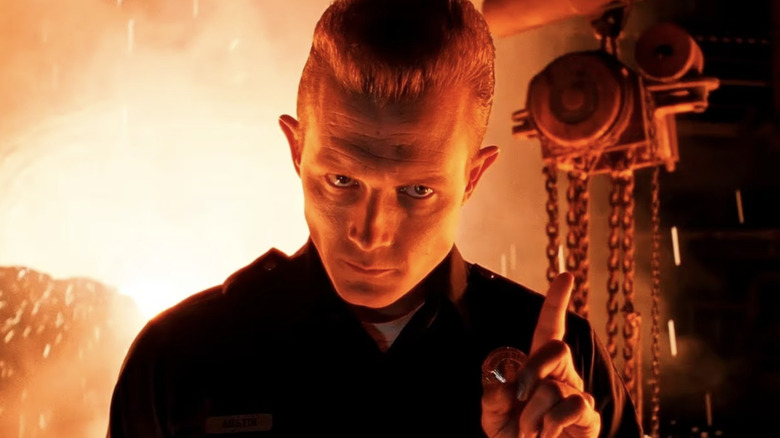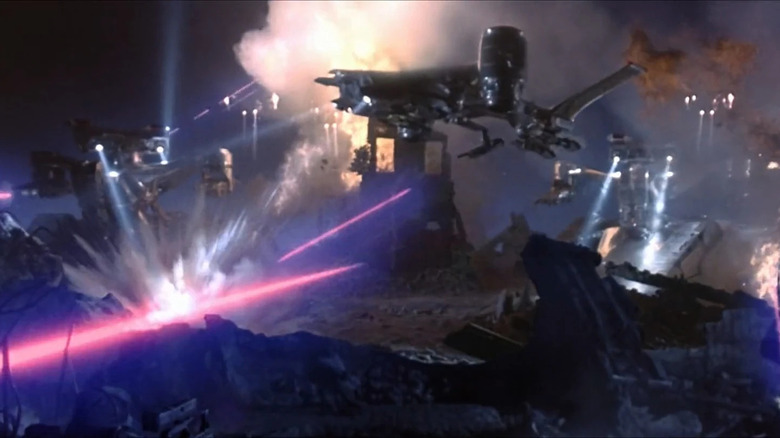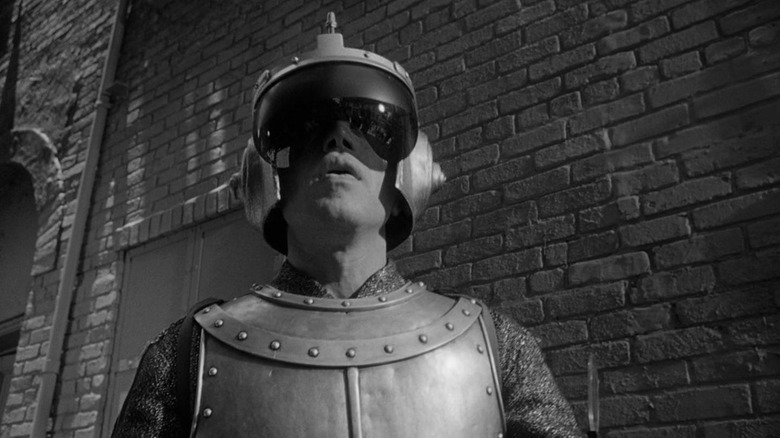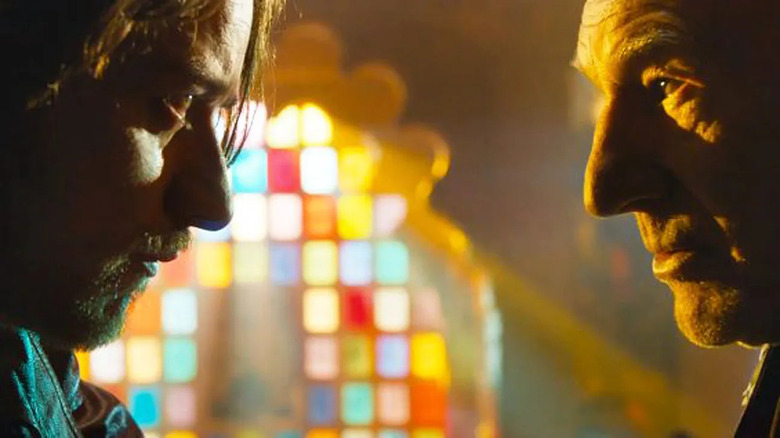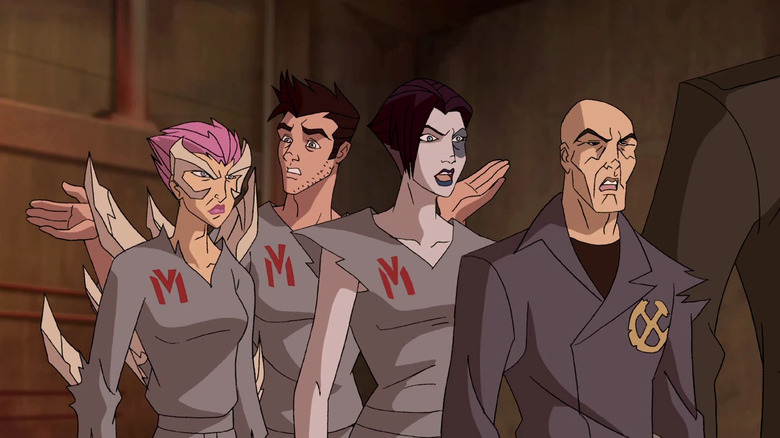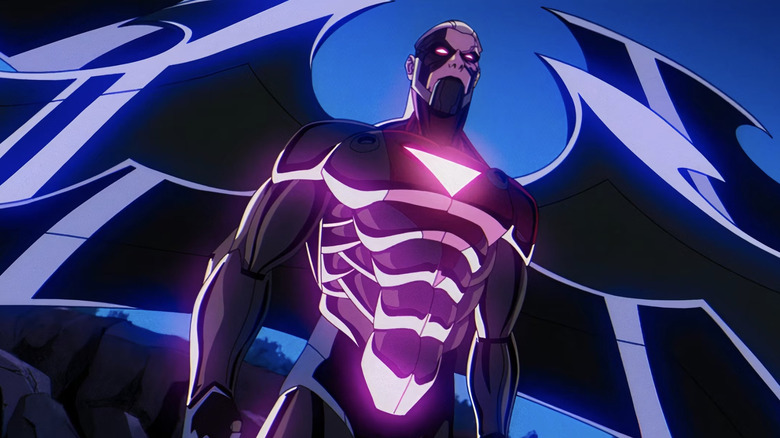Marvel Comics Did The Terminator's Story First
You don't need all your fingers to count the Marvel Comics stories more influential than "X-Men: Days of Future Past." ("X-Men" issues #141-142, written by Chris Claremont, drawn by John Byrne, co-plotted by them both.)
In the dark future of 2013, America has been conquered by the mutant-hunting Sentinel robots. Most of the X-Men are gone, mutants live in concentration camps, and the world stands on its nuclear brink as the other nations prepare to strike against the Sentinels. To prevent this apocalypse, X-Woman Kate Pryde travels back in time (specifically possessing the body of her younger self, nicknamed "Kitty," with the help of telepath Rachel Summers).
You see, things went to Hell on Halloween 1980. Mystique and her Brotherhood of Evil Mutants assassinated anti-mutant Senator Robert Kelly, intent on showing humanity they will supplant them as the Cro-Magnon did the Neanderthal. Instead, this event inflamed anti-mutant sentiment and led to the Sentinel takeover. If Kelly isn't assassinated, maybe this awful future will never happen.
"Days of Future Past" was Byrne's penultimate story on his original "X-Men" and he goes with a banger. (Byrne first drew "X-Men" issues #108-109. After Dave Cockrum and Tony DeZuniga drew issue #110, Byrne took over as the book's regular artist on #111, ultimately penciling the climactic arc "The Dark Phoenix Saga.") Byrne's tenure concluded with "X-Men" #143, an "Alien" riff where Kitty Pryde plays Ripley (Sigourney Weaver) after a demon invades the empty X-Mansion.
You might be thinking that "Days of Future Past" itself is a movie homage. The whole premise (sending someone back in time, a robot-dominated dystopia, etc.) sounds like "The Terminator," right? When "X-Men: Days of Future Past" was adapted as a movie in 2014, the filmmakers even consulted "Terminator" director James Cameron and many reviews (/Film's own included) referenced "Terminator."
Well, you'd be wrong. "Days of Future Past" was published in 1981, three years before "The Terminator."
X-Men: Days of Future Past is the original Terminator
Both "Terminator" and "Days of Future Past" are stories born of the Cold War; the two great world powers had nuclear missiles pointed at each other and the world ending was just a flicked switch away. That both stories arrive at artificial intelligence rebelling and controlling its human creators is a science-fiction extension of the baked-in nuclear armageddon; humanity is undone by machines it created.
It's telling that the "Days of Future Past" movie doesn't include the detail that, should the X-Men's mission fail, the Earth goes up in nuclear fire. In a post Cold War era, the way-too-many nuclear bombs we still have aren't on people's minds as much (unless they saw "Oppenheimer"). Though, if we're talking outdated politics, "Days of Future Past" mentions that the Supreme Court initially struck down the Mutant Registration Act, forcing government officials to go the Sentinel route instead. Describing the SCOTUS as a civil rights champion is absolutely laughable in 2024.
Comparing The Terminator and X-Men Days of Future Past
Though sharing similar premises, the structures of the film and comic are different. In "Days of Future Past," there's only one time traveler; the story already has the villains it needs in the present day. Throwing in a Sentinel agent sent back to stop Kitty would bloat the narrative too much to fit in two issues. In "The Terminator," though, the chase between the T-800 (Arnold Schwarzenegger) and Kyle Reese (Michael Biehn) to reach Sarah Connor (Linda Hamilton) is the whole point. It's also the villain trying to change the future (by erasing eventual human resistance leader John Connor), while the heroes are trying to preserve it (since humanity wins in the end).
"The Terminator" is set mostly in the present; the film's meager budget wouldn't allow anything outside of one measly flashback by Reese (though "Terminator 2" was a different story). "Days of Future Past," though, cross-cuts between the present and future; take note of the opening page of part 2, where a teenage Kitty is superimposed as the border between 1980 and 2013, when the remaining X-Men (Wolverine, Storm, Colossus, Rachel, and Franklin Richards) try to stop the Sentinels conventionally. They fail and are slaughtered; the last panel of the future is Rachel cradling an unconscious Kate, telling her their future rests on her shoulders.
Fate in Terminator and X-Men
This leads to the thematic backbone of both stories: the mutability of fate. In "Days of Future Past," the X-Men succeed in saving Kelly. But the comic doesn't show a happy future afterwards — or any future. The X-Men (and the reader) are left wondering if their actions meant anything, or if the bleak future is still on course (an epilogue with Kelly initiating a new Sentinel program, Project Wideawake, suggests that it is). Professor X summarizes, "As cliché as it sounds, only time will tell."
Now, like all Marvel characters, the X-Men are frozen in time. Notice how it's been 40+ years since "Days of Future Past" was published and their world has never gotten so dire. This diminishes the uncertainty of the ending, but in a vacuum, it's still haunting.
"Terminator" goes back and forth on the question of fate. The original 1984 film ends with the story as a closed loop and Sarah acknowledging that a storm is coming. "Terminator 2" shifts gears into there being "no fate but what we make" — the Connors prevent the apocalyptic Judgment Day and the ending offers hope that humans can be better. 2019's "Terminator: Dark Fate" (the only sequel since "T2" that Cameron was involved with) then counters that while the Connors stopped one specific apocalypse, it might be humanity's destiny to fall to its own creations sooner or later.
Did X-Men: Days of Future Past inspire Terminator?
In 2007, Byrne was asked on his personal web forum if he thinks James Cameron was inspired by "Days of Future Past" when making "Terminator." Byrne refrained from leveling any accusations and instead fessed up to how (unintentionally) similar "Days of Future Past" is to 1972 "Doctor Who" episode "Day of the Daleks" (when assassins from the 22nd century travel through time to kill a 20th century diplomat, believing his death will prevent a Dalek-ruled future). When he rewatched the episode years afterward and noticed the overlap with his comic, "[He] learned the ever-so-important lesson to be wary of storylines that seem to spring from nowhere, almost fully formed," Byrne wrote.
As for Cameron, he's never to my knowledge spoken about "Days of Future Past." "X-Men" had become Marvel's bestseller under Claremont and Byrne (hence the company greenlighting spin-off after spin-off title before the '80s were over), but comics were still more niche in the 1980s than they are today. So, I'd say it's plausible Cameron had never read "Days of Future Past" and the similarities are coincidental. He's obviously aware of it now, though, between having consulted on the movie and penning an ultimately-unmade "X-Men" script in the 1990s.
However, it's tempting to imagine that Cameron knocked off "Days of Future Past" because there has been controversy (and legal challenges) surrounding "The Terminator."
Harlan Ellison's Terminator lawsuit
Legendary science-fiction writer Harlan Ellison loved "The Terminator." He also alleged that the movie plagiarized his 1957 short story "Soldier From Tomorrow," later adapted in the "Outer Limits" episode "Soldier" in 1964. Orion Pictures and the Hemdale Film Corporation settled with Ellison and gave him an acknowledgement in the credits over Cameron's objections. In the 2009 book "The Futurist: The Life and Films of James Cameron" by Rebecca Keegan, Cameron broke an old gag order and explained:
"It was a nuisance suit that could have easily been fought. I expected Hemdale and Orion to fight for my rights, but they abandoned me. The insurance company told me if I didn't agree to the settlement, they would come after me personally for the damages if they lost the suit. Having no money at the time, I had no choice but to agree to the settlement."
Having read and watched Ellison's "Soldier," I ultimately side with Cameron. "Soldier" doesn't have much in common with "Terminator" outside of the basic premise (a soldier going back through time). Details like a nuclear apocalypse, a malevolent AI, and the future soldiers from opposing sides trying to save/terminate a woman in the past are Cameron's own.
Is The Terminator a rip-off of a Harlan Ellison story?
Time traveler Qarlo Clobregnny spends much of "Soldier" incarcerated, trying to communicate with philologist Tom Kagan; quite a different speed than the thrill ride of "The Terminator." The "Outer Limits" episode has another enemy soldier sent back hunting Qarlo, but that's only there to pad out the story and give it a tidier resolution where both soldiers kill each other.
In the short story, Qarlo instead becomes an anti-war advocate, telling humankind to embrace peace lest his future become theirs. This ending strikes the same uncertain note as "The Terminator" and "Days of Future Past" — which only shows how universal this theme of fate is in time travel stories. "Soldier" is not even Ellison's only story about time travelers from the future intervening in the past. (The classic "Star Trek" episode "The City on the Edge of Forever," anyone?)
However, "Soldier" was ripped off by a different writer, earning Ellison another settlement. That story brings us back to Marvel Comics; writer Bill Mantlo used "Soldier" as the basis for "Incredible Hulk" #286 in 1983. This one, unlike "Terminator," is a bald-faced rip-off; it even uses the same idea of the future soldier's language being a condensed form of English.
Then Marvel Comics Editor-in-Chief Jim Shooter recounted his side of this story on his blog in 2011. He claimed he signed off on the issue because he had not seen or read "Soldier" ("I remember thinking what a good story it was, and that Bill must be improving [as a writer]"). He only learned the truth once the issue was published. He calmed an incensed Ellison by admitting his mistake; the matter was settled by giving Ellison a check (the same amount Mantlo got for writing the comic), an acknowledgement, and "a lifetime subscription to everything [Marvel] published."
The Influence of X-Men Days of Future Past
I won't defend Mantlo's plagiarism, but when you're on the grind of writing comics monthly, it's easy to fall back on familiar and "homages." Byrne admitted he did so with "Days of Future Past" — though, as I mentioned before, we got one of the defining "X-Men" stories out of it.
"X-Men" is a story about tolerance, but mutant prejudice took a backseat during Claremont's early issues in favor of soap/space opera highs. "Days of Future Past," with its bleak suggestion that mutant acceptance was not foregone and things could get even worse, brought these themes back with a vengeance. It's no surprise that when "X-Men" media needs to fill the role of a scummy, anti-mutant politician, it usually uses Senator Robert Kelly (see him as played by Bruce Davison in the 2000 "X-Men" film).
"Days of Future Past" was also the first comic to suggest Magneto could be a good guy; he's part of the future X-Men and even uses a wheelchair like Professor X did. Claremont would realize this potential eight issues later in "I, Magneto..." ("Uncanny X-Men" #150, art by Dave Cockrum) when he finally delved into Magneto's past and why he fights for mutant dominance.
Byrne's cover for "X-Men" #141 (inked by Terry Austin), where the 2013 Logan and Kitty standing in front of a wanted poster declaring the X-Men as either "slain" or "apprehended," has itself inspired countless homages.
Adaptations of X-Men: Days of Future Past
With it being one of the most famous "X-Men" stories, "Days of Future Past" has been adapted again and again. There's the aforementioned 2014 movie, which uses the time travel story to bridge the original "X-Men" cast (Patrick Stewart, Ian McKellen, etc.) with that of prequel film "First Class" (James McAvoy, Michael Fassbender, etc.). In the movie, Wolverine (Hugh Jackman) is the time traveler, though Kitty's (Elliot Page) powers are the ones that send him back.
Before the movie, "X-Men" cartoons did the story too. The 1992 "X-Men" series opened with two-parter "Night of the Sentinels," so "Days of Future Past" was the perfect story to wrap up its first season. The two-part episodes 11 and 12 (titled "Days of Future Past") loosely adapt the comic story, though with some altered details to fit the different cast. Bishop is sent back in time, not Kitty Pryde, while Mystique assassinates Kelly while disguised as Gambit to frame the X-Men. Rather than Nightcrawler getting an early hint that Mystique is his mother, Rogue briefly reconnects with her "mama."
The cartoon also goes for a more definitive ending in episode 13, "The Final Decision." After the X-Men stop Mystique, Magneto abducts Kelly as part of an unrelated assassination plot; the Sentinels save Kelly, but only to remake him as a puppet. Destroying the Sentinels becomes the X-Men's last challenge of season 1.
Why the Sentinels are the X-Men's ultimate villains
The short-lived 2009 cartoon "Wolverine and the X-Men" used "Days of Future Past" as the overarching story of its first and only season. The season employed parallel storylines; in the present, the X-Men (led by Wolverine in lieu of a comatose Professor X) try to stop the rise of the Sentinels.
The title sequence to "Wolverine and the X-Men," though not as famous as the 1992 opening, features the X-Men battling jackboots and Sentinels rounding up mutants in the streets of NYC. In the Sentinel-dominated future the X-Men are fighting to prevent, Professor X leads a resistance group. The season's 26 episodes bounce back and forth between the present and future storylines.
Most generally, "Days of Future Past" solidified the Sentinels as the greatest threat to mutants' future, thereby positioning AI as the third front in the human/mutant evolutionary war. This dynamic is playing out in "X-Men" stories told today; the recent Krakoa era of "X-Men" comics feature anti-mutant group Orchis led by the super Sentinel Nimrod. Similarly, the main villain of the fantastic first season of "X-Men '97" (a revival of the '92 show) is Bastion, a human/Sentinel hybrid who wants to make more like him and enslave mutantkind. Bastion offers an alternative path for human evolution, driven not by biological mutation but by technological innovation. This drive is why the Sentinels make so much sense as the X-Men's enduring foe; they represent humanity trying to invent its way out of extinction, only to cause it in the process.
At the 2023 Dell Technologies World forum, Cameron said he's holding off on completing a new "Terminator" script until he knows how real AI technology pans out. I hope for all our sakes it doesn't go the route depicted in "Terminator" and "X-Men."
